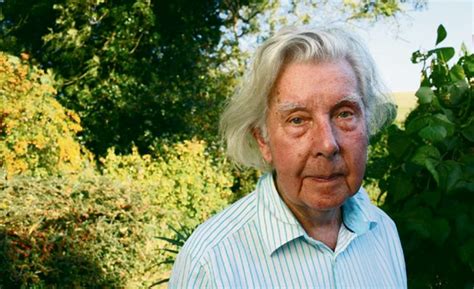
Ronald Blythe was one of the great English writers of the second half of the twentieth century, and a great lover of the English countryside. He was also one of the Friends of Little Gidding right up until his death a week ago. This item appeared in the Friends Newsletter in April 2012, and is republished now as a tribute. Ronald Blythe 6 November 1922 — 14 January 2023, Friend of Little Gidding. May he rest in peace.
Ronald Blythe, preacher at the Eucharist at 2011’s Pilgrimage, subsequently wrote this piece in his ‘Word from Wormingford’ column in the Church Times, 27 May 2011.
‘If you came this way,’ wrote the poet famously,’ … you would find the hedges White again, in May, with voluptuary sweetness.’ And he was right. It is the feast of Matthias, the otherwise anonymous man chosen to mend the broken circle, and we are on pilgrimage to Little Gidding.
The verges wave with cow parsley, the clouds are mountainous, and red kites are acrobatic. It really is the most marvellous tramp. At Steeple Gidding, I watch the procession breast a grassy hill, a happy ‘over the top’, and I hear the litany being blown about as it descends to the redundant church. Young and old, familiar nameless faces, often beautiful, enter its cold space. Then the last lap to where Eliot found that ‘prayer is more than an order of words’.
The Bishop of Peterborough lays flowers on Nicholas Ferrar’s tombstone. The Ferrar brothers and George Herbert were Westminster schoolboys who could hardly have expected to end up here in Huntingdonshire.
Part of their education was to be crocodiled along the Thames path by Lancelot Andrewes, learning all the way. And, rather to my surprise, for one can become blasé about modern pilgrimage and its attempt to get into step with another age, I find myself also learning all the way.
I have, as a matter of fact, come this way a number of times without moving on from literature into faith. But today it is different. It must be the tumultuous weather, the realisation that our route is the one that Nicholas rode on his horse when, at his old schoolfriend’s careful instruction, he cancelled the ruin of Leighton Bromswold.
This was where our pilgrimage began. To somehow lift the meanness of Bemerton it had been decided to give Herbert the prebendal church of Leighton Bromswold.
It was wrecked, needless to say. Everything they gave him was in disorder, the priesthood most of all. He probably never saw Leighton Bromswold, but today we certainly saw him. I preached from the right-hand pulpit, looking down on the wide aisle. He had told Nicholas to think of Isaiah 35 when he got the builders to make it.
‘And an highway shall be there, and a way, and it shall be called the Way of Holiness … it shall be for the wayfaring men … but the redeemed shall walk there.’
Herbert’s pale benches bank this purposeful aisle, and his greenish glass casts a springtime light. We move from his handsome nave to his purposeful sanctuary for the eucharist. Shorts, big boots, dog-leads, packs. Now and then I find myself wondering ‘what the dead had no speech for when living’, as the lovely familiar words that Herbert ‘set’ in his verse are said yet again.
At Little Gidding, five miles away, another feast awaits, plus for myself a destination loaded with language. Such imagery. Such inescapable sentences and songs and memories and friendships. Herbert would have been delighted. ‘Delight’ was high in his vocabulary. Although young, he could not walk far, owing to the ‘mole working away in his breast’, that is, TB.
